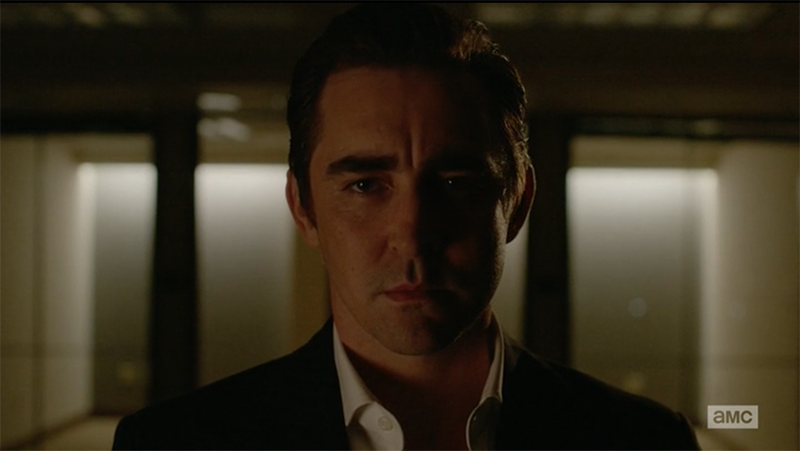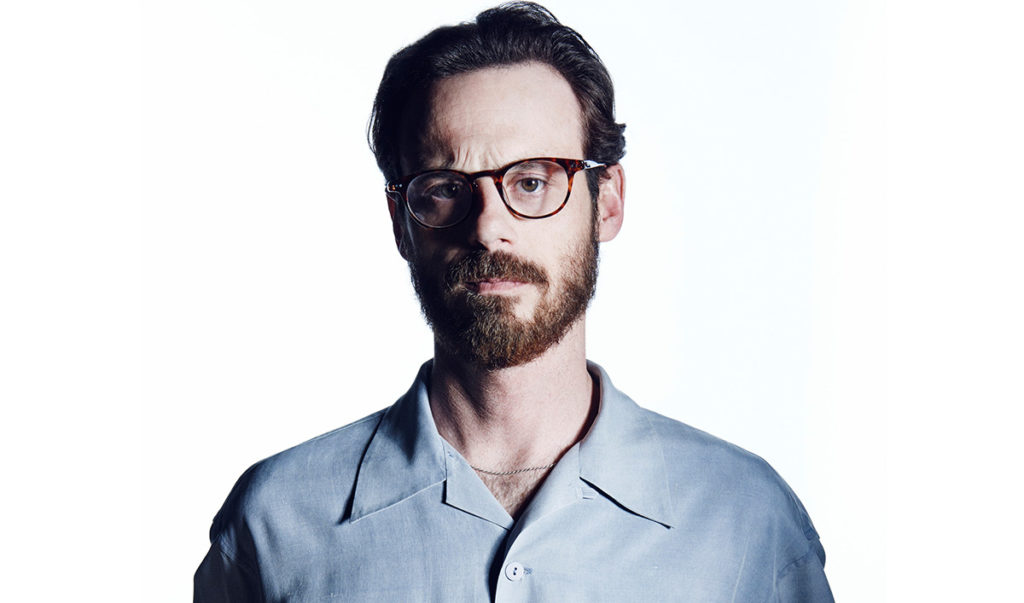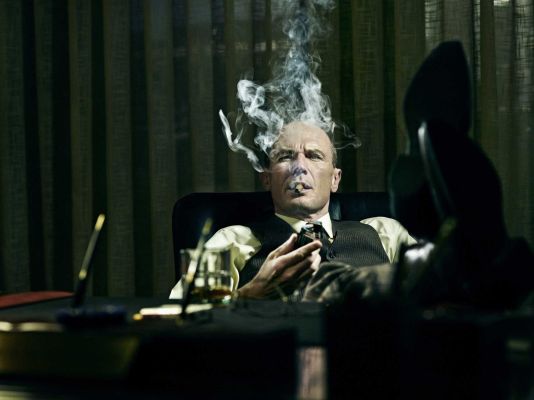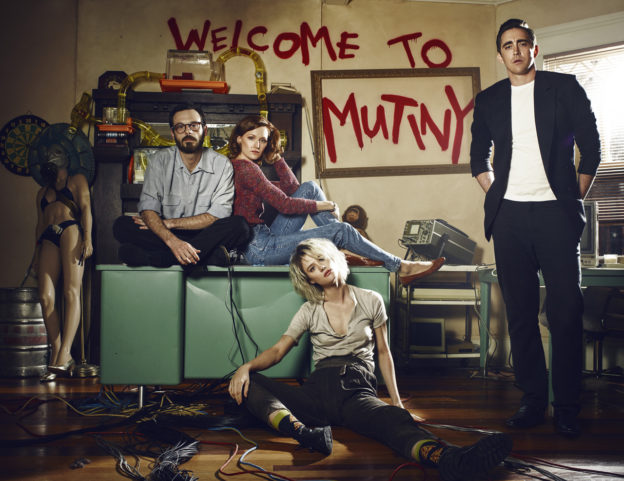Halt and Catch Fire is the best show you’ve never heard of. Allow me to explain.
The first thing to understand about Halt and Catch Fire is that despite being a period drama on AMC, it is not Mad Men. I say that to you now, suspecting that one of the creators had to say this to the network at some point during season one.
Halt and Catch Fire just completed its fourth and final season, and it has been a hell of a roller coaster. In the beginning, it was about a would-be tech visionary recruiting a failed computer designer to create the next big thing in PCs, but it was so devoted to re-invention over its four seasons (as is fitting for a show about tech visionaries) that in the final episode, those two characters barely appear. And along the way, it went from a pretty good period drama to a great one.
Love, War, and Computer Culture
Halt and Catch Fire centres around five brilliant but often broken people trying to be the next big thing in computer culture, a place where “the next big thing” shifts frequently and unpredictably. It begins in 1983, as they attempt to break into the home PC market, but goes on to cover 11 years of developments and advancements in the dawning internet age as the leads continue to chase the bleeding edge. Online gaming. Online community and commerce. Anti-virus. The dawn of the world wide web. In all cases, united or divided, they strive to be the leaders in an ever-shifting, hyper-competitive marketplace.
All five are lovable and hateable in equal measure. Together or apart, they form a riveting ensemble. Between 1983 and 1994, they love each other, hate each other, support each other, try to destroy each other, build businesses, lose businesses, and are constantly on the verge of being the first or best to market with some new innovation. But no matter how many times they screw each other over, no matter how much damage they cause to each other, there is still a bond between them that often weakens, but never fully breaks. Which is good, because it keeps them banging off each other.
Sure, in the beginning, it leans towards Mad Men. We have an enigmatic, charismatic leading man with a mysterious past in a period drama, but within season one they wisely move past that. And even in the beginning, there’s an important difference between Halt and Mad Men… a little thing called pacing.
Mad Men had a very nuanced, subtle, gradual pace. Events would creep along through small actions and awkward silences, building slowly until everything burst in the finale. Throughout the first season, Halt and Catch Fire would introduce a crisis, build it to a fever pitch, force someone to make a compromise someone else hated to fix it… and still have enough episode left for some even worse crisis to destroy their momentary peace. Future seasons calmed down a little, but you could never call the show uneventful.
The setting, the central plot, and central theme all shift throughout the series, but the core never does: Cameron, Donna, Joe, Gordon, and Bos. Let’s meet them.
Cameron Howe

When we meet Cameron Howe (Mackenzie Davis, who’s picked up three high-profile sci-fi gigs since doing this show– The Martian, Black Mirror: San Junipero, and Blade Runner 2049), she’s a punk programmer sneaking into college lectures about the coming computer age. More often than not, she’s the smartest person in the room, and painfully, aggressively aware of that.
Cameron dreams of true innovation. She doesn’t want to build a slightly better IBM, she wants to build a truly new computer. When video game design draws her interest, she doesn’t want to just make Centipede. She wants a wholly new, wholly different game experience. Cameron Howe would be the bleeding edge of the internet age if it weren’t for a few… quirks.
Cameron does not play well with others. She’s a loner by nature and doesn’t excel at “collaboration” or “cooperation.” She views partners and investors as encumbrances, not teammates. She expects her teams to dance to her tune, even when she’s making no effort to teach them the words. She alienates people, forces them to take actions she doesn’t agree with, and even when she’s right, she’s usually burned too many bridges for it to matter.
And the show really took off when it realized that she was its actual heart. Her and…
Donna Clark

Donna Clark (Kerry Bishé) was set up to be simply the long-suffering wife of one of the main characters, and thank the TV gods they sobered up from that, because a) that’s a tired cliche, and b) both Donna the character and Kerry the actress are better than that.
Donna is married to Gordon, and is mother to their two daughters, and while season one sets up Gordon as the big, gifted, engineer and computer builder, it also makes it clear that Donna is his equal. She can’t program like Cameron, few can, but she can build as well as anyone.
Not that people tend to notice, because it’s 1983 and she’s a woman. And, spoiler alert in case you haven’t noticed all of the everything, being taken seriously as a woman did not exactly get easier over the next ten years. And that’s more of an issue for her than it is for Cameron, since she’s the one actually willing to work with people to get ahead.
Also, she doesn’t really care for being the mother to anyone but her kids, and her compatriots have a tendency to force her into the position. Being the responsible one, the grounded one, the one willing to make the compromises, the one who has to see the larger picture beyond just the dream. And when you’re dealing with volatile visionaries like Cameron and Joe, or just the habitually wounded pride of her husband, that can cause turmoil.
Donna has dreams, she has ideas, she’s as capable of chasing the next horizon as anyone else in the cast, but there are a couple of things she’s missing. She doesn’t have Joe’s manipulative charms or Cameron’s determination to live or die by her work alone. What she does have, in place of those things, is a willingness and ability to work the system. To make connections, build relationships, to care about audience engagement and put what they want over what she thinks they should want, something Cameron struggles with. Or something Cameron would struggle with if she didn’t find it all so beneath her.
Look, I love Cameron in general, but sometimes… look, the ain’t anybody you can root for every episode.
Case in point, our theoretical lead character…
Joe MacMillan

Joe MacMillan is played by Lee Pace, who was the Piemaker in Pushing Daisies and as a result has my love and loyalty forever. In the beginning, he has recently left IBM, fancying himself a visionary. He can see where computers are heading and is determined to get there first at any cost: financial, human, or otherwise. He comes to Cardiff Electric, Texas-based manufacturer of typewriters and radios, and infiltrates it to push them to build a home computer that will challenge his former employers. It is 1983, one year before Apple debuted the Macintosh. The timing is not coincidence.
Joe McMillian was introduced as an enigma, a man of mystery with a hidden past and unexplained scars and a mysterious agenda, and thank Buddha and all of his wacky nephews that they got the Hell over that. There are two things they did with Joe in season two that improved the show immeasurably: first, they made him more of a fun human being; second, they realized he wasn’t the lead. Even if he would be top-billed all the way through, because opening credit politics are what they are.
Joe does have a certain amount of vision. He must, because he finds himself at the forefront of a lot of industries, one way or the other. He also has a certain amount of charisma, because he keeps drawing people to his banner… even the other leads, who after his initial actions have so many reasons to doubt him.
Because more human or not, Joe’s got his flaws. He’s not the best team player, since he’s willing to fight entire companies if he feels they’re holding back his vision. He’s willing to burn anyone he has to if the project demands it. And when a project or a company goes wrong (which they often do, this is not a happy show where everything always works out), he can lash out in sometimes extreme ways. Joe MacMillan does not fail gracefully.
But once they’re done trying to turn him into Computer Don Draper, they find something worth rooting for at his core. A love for his colleagues that makes the shift from “Manipulating them to create the Cardiff Giant” to “He created the Cardiff Giant as an excuse to work with Gordon and Cameron” believable and touching.
Even when his story is mostly detached from the others, he’s a key part of the show, but it’s still for the best that they moved the focus away from him after the first season. Not because he doesn’t work, but because the ladies just work better.
Gordon Clark

Gordon Clark (Scoot McNairy, who you’ve certainly seen in something) tried and failed to launch his own computer alongside Donna, and the failure was a costly one, in terms of savings, pride, and Gordon’s standing in the eyes of Donna’s parents. When we meet him in 1983, he’s a simple engineer at Cardiff Electric, a broken man who’s abandoned ambition. Until, that is, Joe talks him into reverse-engineering an IBM to build their own PC.
Gordon’s a builder at heart. He’s never happier than when he’s prying open a machine and putting it back together, better and stronger. He and Joe have the best working relationship, if still not consistently, which makes sense because he and Joe were supposed to be the leads until it became clear that Donna and Cameron should take over.
Maybe it’s because Joe can sense that Gordon still has the drive, the need to be a success on his own terms rather than just a Cardiff Electric cog. But the sting of his previous dream’s death hasn’t fully left him, and it means he has one thing Joe doesn’t: a willingness to settle. To plateau. To say “This is enough.” But the line where he’s willing to do that isn’t low enough to make life simple.
Gordon and Donna’s dreams do not sync up as often as either of them would like. Often one’s dream comes at the expense of the other, and that puts a strain on their relationship, and their relationship with their kids. All is seldom well in the Clark household, and Gordon makes some typical 80s-success bad choices that don’t help in the matter. Or help him in general.
But if there’s something to be created in order to find the next big thing, Gordon’s not hard to talk into joining in.
John Bosworth

John “Bos” Bosworth (Toby Huss), career salesman, has been at Cardiff Electric since most of the cast were kids. His is a simple life of southern-charm sales pitches and golf with clients, which is utterly upended when Joe MacMillan arrives and, before Bos and any of the bosses know it’s happening, tricks/forces them to rebuild Cardiff into a computer company, bringing down the wrath of IBM.
But as much as Bos resents how Joe is changing Cardiff, the more important change is what’s happening to Bos himself. His resentment thins. He bonds more and more with Cameron, becoming a surrogate father to her (her father is alive, but she and her parents don’t exactly get along). The glow of the computer age infects him, even if it doesn’t endear him to Joe in a rush.
Older than most? Sure. Computer literate? Not very. But he sees the future the others are building, and he wants in, even if he’s past his prime. He’s hungry to be part of this, and hunger plus limited time equals desperation, desperation leads to bad choices, and on this show, bad choices lead to big consequences.
But nothing short of death ever drives these people apart forever, and Bos’ folksy charm hides real skill for business and with people, something the others sometimes find themselves needing. Which works for Bos, because he needs them to need him, as after decades of life in sales, it’s only chasing after the dreams of his younger colleagues that he’s spotted his purpose, and he can’t lie down and rest before he’s caught it.
Final Thoughts
I feel like I should do more than talk about the characters here, but the fact is that each season is a new ride (featuring time jumps mild and extreme in between), each ride is bumpy as hell, and I feel I’d be doing you a disservice by hinting at what any of the bumps are. I can say this: if the Cardiff Giant story of season one isn’t grabbing you, skip to the last two episodes of the season. Witness COMDEX, the birth of Mutiny, the first great fracturing of the central cast, and dive into a much-improved season two as Cameron and Donna take centre stage, attempting to invent online gaming in the time before Nintendo and Sega resurrected home consoles. See Bos rise from the ashes, Joe struggle to bounce back from a humbling computer convention, Gordon flounder for a new purpose, see the whole board change as the show finds a new structure.
There are incredible visual flourishes on this show. In one episode, there’s what seems to be a single tracking shot following Gordon, but this simulated single shot covers months or even years as a company grows from conception to construction to growth and expansion and finally to stagnation, and relationships strain and collapse in a few minutes that encompass a season’s worth of of drama. But lower-key than usual drama, nothing super exciting, so it’s okay that it’s just one shot in just one episode.
See Gordon and Donna’s girls grow up, one of whom grows into a computer whiz in her own right, and begins to steal the last season.
See Joe discover what the One Big Thing he’s been chasing this whole time really is… and whether or not he ever catches it.
See Cameron’s dream of what computer games can be collide with the birth of a drastically different take, the ultra-violent first-person shooter.
And let an incredibly talented cast make you love the flawed, sometimes broken, often wonderful characters pushing the story along.
If you’re in Canada, the first three seasons are on Netflix and the fourth will be along eventually, I’m sure. I know that it’s peak TV, and everyone and their streaming service has a recommendation, but the finale… the finale was a thing of beauty, and not every series can claim to have gone out that strong, and based on that I felt I had to share this show with you all.
And then life happened and this post got hell of delayed on me, but it’s still valid. So go, my pretties, binge, binge.
Next time… hadn’t we just gotten to my favourite era of Doctor Who? I should get back to that.

